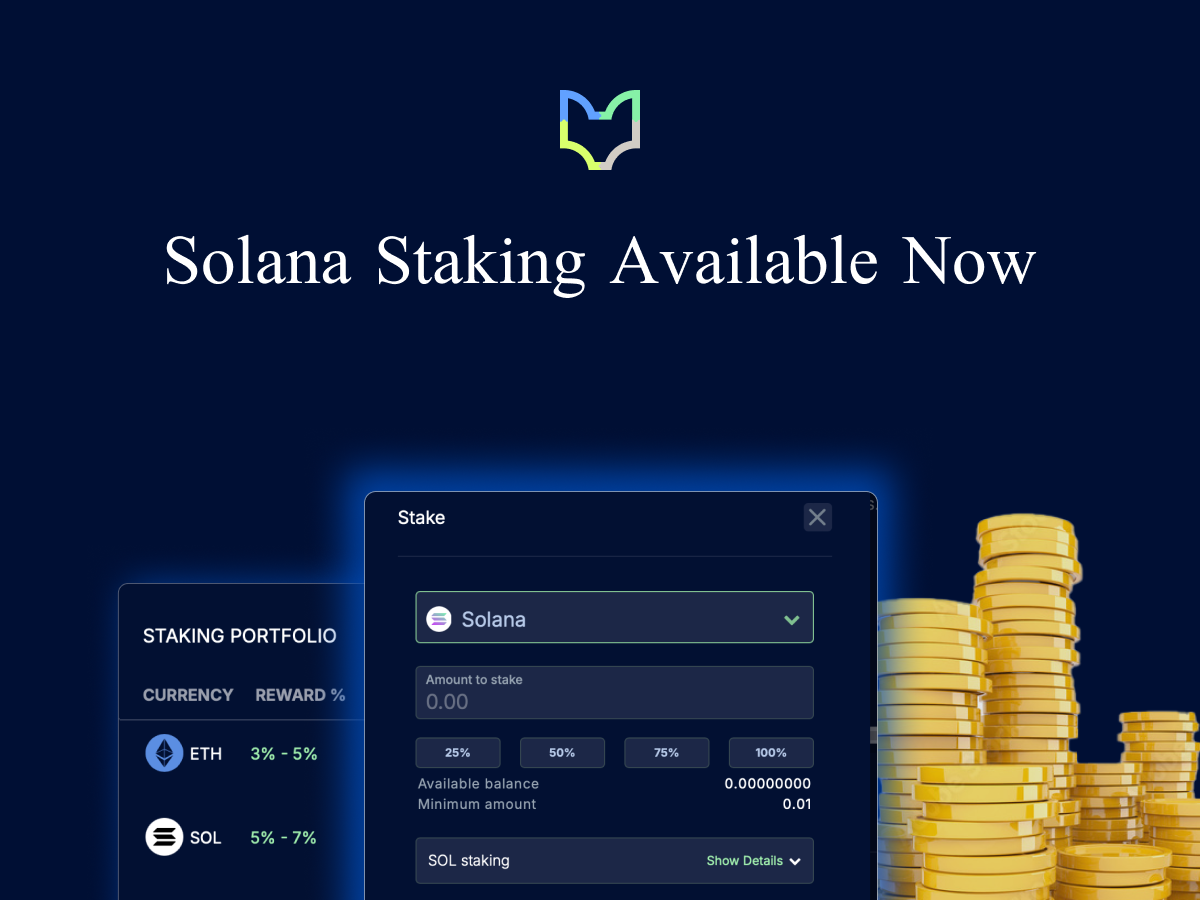In August of 2017, crypto broke new ground in redefining money and the raising of money.
On August 1, Bitcoin Cash forked from Bitcoin, sounding the voice of a new community intent on developing the most convenient and widely used digital cash. Eight days later, initial coin offerings for projects built on the Ethereum network surpassed the total early-stage VC funding raised for internet companies in the previous two months.
These two projects have made ambitious headway in promulgating decentralized versions of two of the most ubiquitous concepts of modern times: money and software.
Bitcoin Cash and Ethereum have come a long way in just 11 months — but how are they stacking up against each other, and what are the best ways to compare them?
Here’s how Bitcoin Cash compared with Ethereum on August 1, 2017:
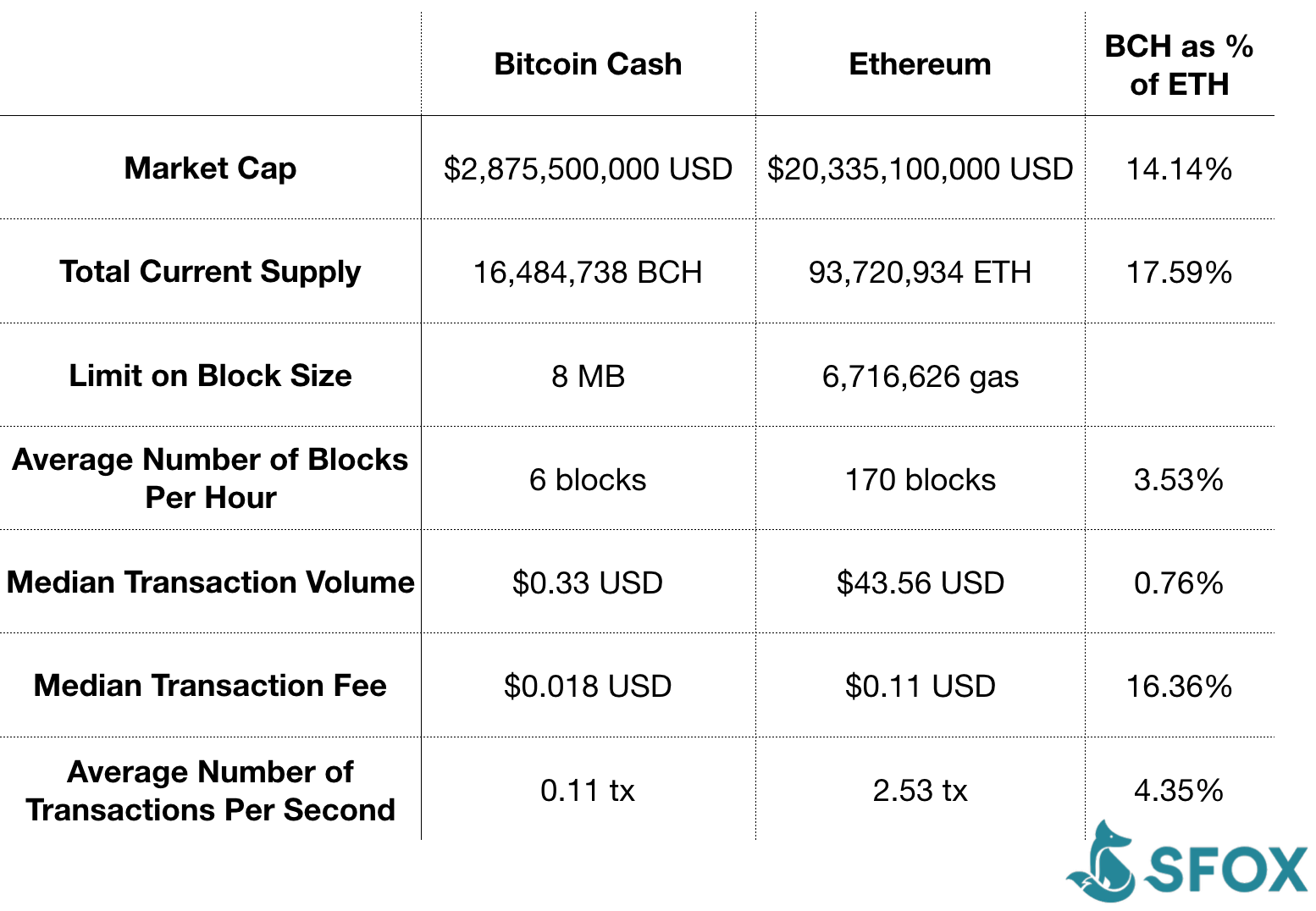
And here’s how they compared with each other on June 27, 2018:
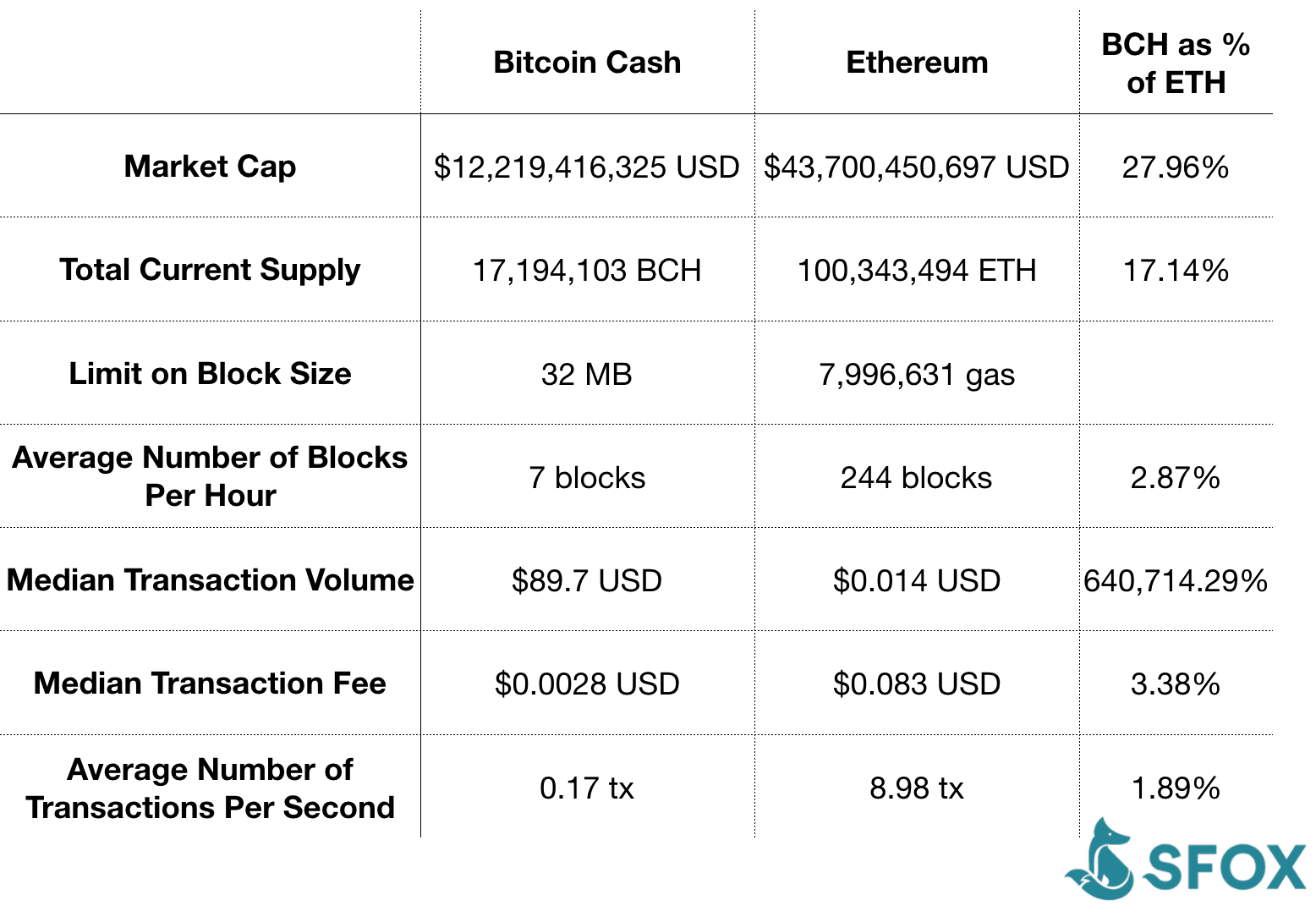
While Bitcoin Cash and Ethereum are drastically different projects, there are key metrics — like transaction volume and transaction fees — that are critical to the progress of both. When we dive into those numbers, it looks like Bitcoin Cash is quickly gaining on Ethereum, despite the fact that Ethereum had a two-year head start.
Flexibility: good for a computer, bad for a currency
Just like we said when we compared Bitcoin to Ethereum, comparing these two blockchains is like comparing apples to oranges. That’s because the two are being developed with largely antithetical functions in mind: Bitcoin Cash is meant to be a secure form of payment, whereas Ethereum is meant to be a supercomputer.
Bitcoin Cash has only one use case: It’s intended to be a fast, low-fee, reliable, secure form of peer-to-peer electronic cash. To a degree, it’s useful for digital cash to be programmable — for instance, if you want to use multisig to make sure that some BCH can only be spent by two particular people together — but a currency that’s too easily programmable is susceptible to fraud and manipulation by bad actors.
This is why, like Bitcoin, Bitcoin Cash’s scripting language is relatively primitive: It would be counterproductive to the blockchain’s intended function as money to afford people numerous degrees of freedom in programming it.
On the other hand, Ethereum is all about empowering developers with a wide range of flexibility: Its Turing-complete programming language was developed with the goal of making Ethereum a decentralized supercomputer that could support everything from social networks to games to tokens.
Historically, the flexibility of Ethereum has led to some pretty significant bugs in its smart contracts. For instance, as PeckShield, a startup focused on blockchain security, discovered this past April, an integer overflow vulnerability in some smart contracts that would allow attackers to “transfer [a] huge amount of tokens to an address … with zero balance.” It’s clear enough why vulnerabilities that allow for the theft of huge amounts of value would be an existential threat to a blockchain whose sole purpose is to function as secure, reliable currency — and PeckShield has reported 30 such vulnerabilities in Ethereum’s smart contract layer this year.
Ethereum theoretically could support a currency — and indeed, some do use ETH as a method of value transfer — but the network’s flexibility shows why this kind of use case pulls against the basic functionality of the blockchain. That’s why, even though both Bitcoin Cash and Ethereum are successful blockchains, any comparison of them needs to respect that they are different projects, all the way from their stated purpose down to the level of scripting language.
BCH is beating ETH in transaction fees — but not necessarily for a good reason
Whether you’re a supercomputer or a currency, the cost of transactions matters. You don’t want to lose money in order to spend money, and you don’t want to lose money in order to run software applications. Both Bitcoin Cash and Ethereum have reduced their median transaction fees over the last year, but Bitcoin Cash seems to be doing better in bringing these costs down — though, as we’ll consider, that might just be due to the relatively low demand of Bitcoin Cash vs. Ethereum.
Bitcoin Cash’s median transaction fees have always been less than those of Ethereum. But the difference between them has dramatically increased in the past year: Whereas BCH’s median fee was initially ~16% of ETH’s median fee, the former is now ~3% of the latter.

This change is almost entirely due to BCH’s transaction fees dropping: Whereas ETH’s median fee has dropped ~25% since August 2017, BCH’s has dropped ~85%. Perhaps even more remarkable, BCH’s median fees dropped this dramatically even as its median transaction volume increased dramatically: an increase of over 27,000%, from $0.33 USD to $89.70 USD.
That said, it’s worth noting another way in which comparing BCH to ETH is comparing apples to oranges: Ethereum is a much more popular network than Bitcoin Cash is. There are more than 700k transactions per day on the Ethereum network, with over 30k unconfirmed transactions at the time of writing; in contrast, there are around 13k transactions per day on the Bitcoin Cash network, with about 200 unconfirmed transactions at the time of writing.

Given this difference in total transaction volume, it might not be as surprising that BCH’s fees have been able to undercut ETH’s so sharply: All else being equal, it’s not as expensive to get one’s transactions confirmed on a less crowded network — especially when that network is an order of magnitude less crowded.
Yet a network that intends to run a wide range of software has just as much interest as a currency does in keeping fees low, even if it might be more difficult for the former to realize these low fees than it is for the latter. This is one reason why it’s so important for Ethereum to develop and implement effective scaling solutions that alleviate the pressure that high transaction volume puts on the network.
Here are four major Ethereum scaling solutions that are currently in various stages of development and implementation:
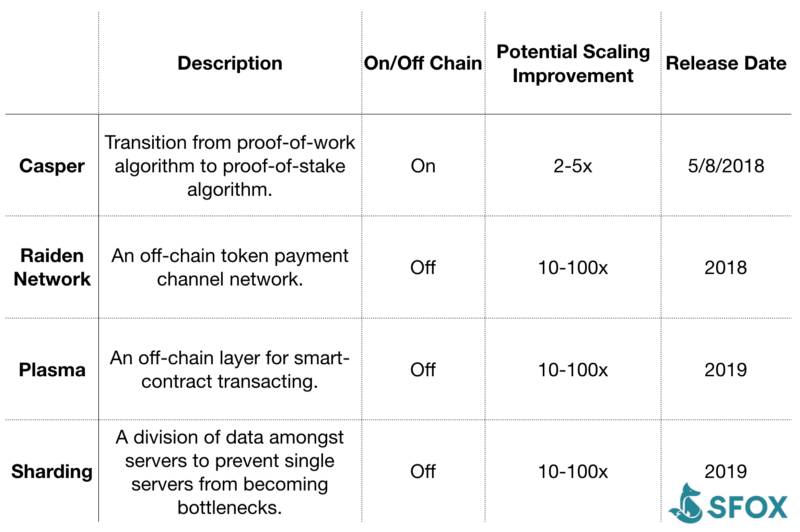
The enormous 32 MB blocks of Bitcoin Cash suggest that it will probably be well equipped to handle increasing volume for a long while — but, with a thriving developer community working on a wide range of scaling improvements, there’s reason to be optimistic that Ethereum will be able to further alleviate its transaction fees in the future.
ETH’s transaction volume is increasing faster—but BCH’s market cap is increasing faster
Like all blockchains, Bitcoin Cash’s and Ethereum’s success depends on people adopting and using those blockchains. For Bitcoin Cash, that means getting consumers and merchants actively using and accepting BCH; for Ethereum, that means getting people developing decentralized applications (DApps), using DApps, participating in initial coin offerings (ICOs), and exchanging tokens. While both Bitcoin Cash and Ethereum have grown significantly in these aspects, the market seems to be rewarding BCH more for its growth than it is ETH.
2017 validated ICOs as an effective fundraising tool for a wide range of companies and projects: Almost $3.9 billion USD was raised through a total of 210 ICOs.
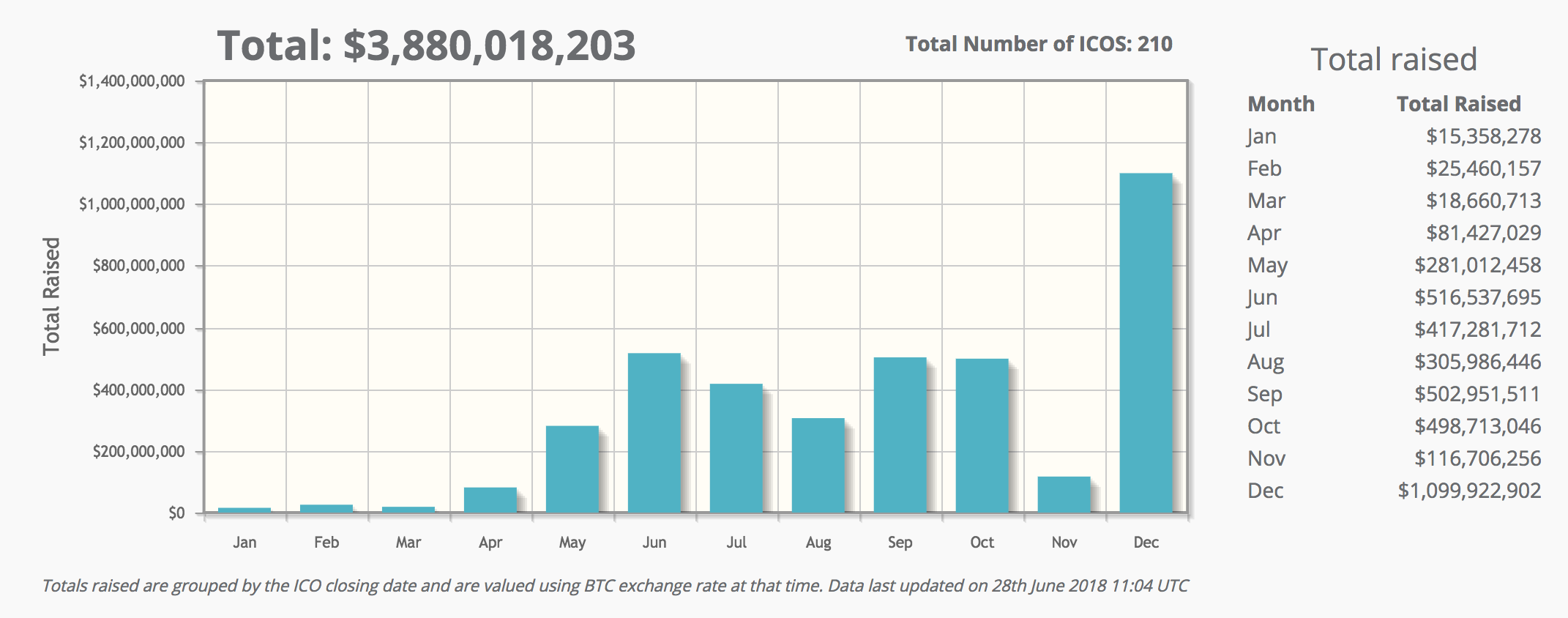
This trend has continued in the first half of 2018: So far this year, over three times as much money has been raised in the ICO market, compared with that raised in 2017.
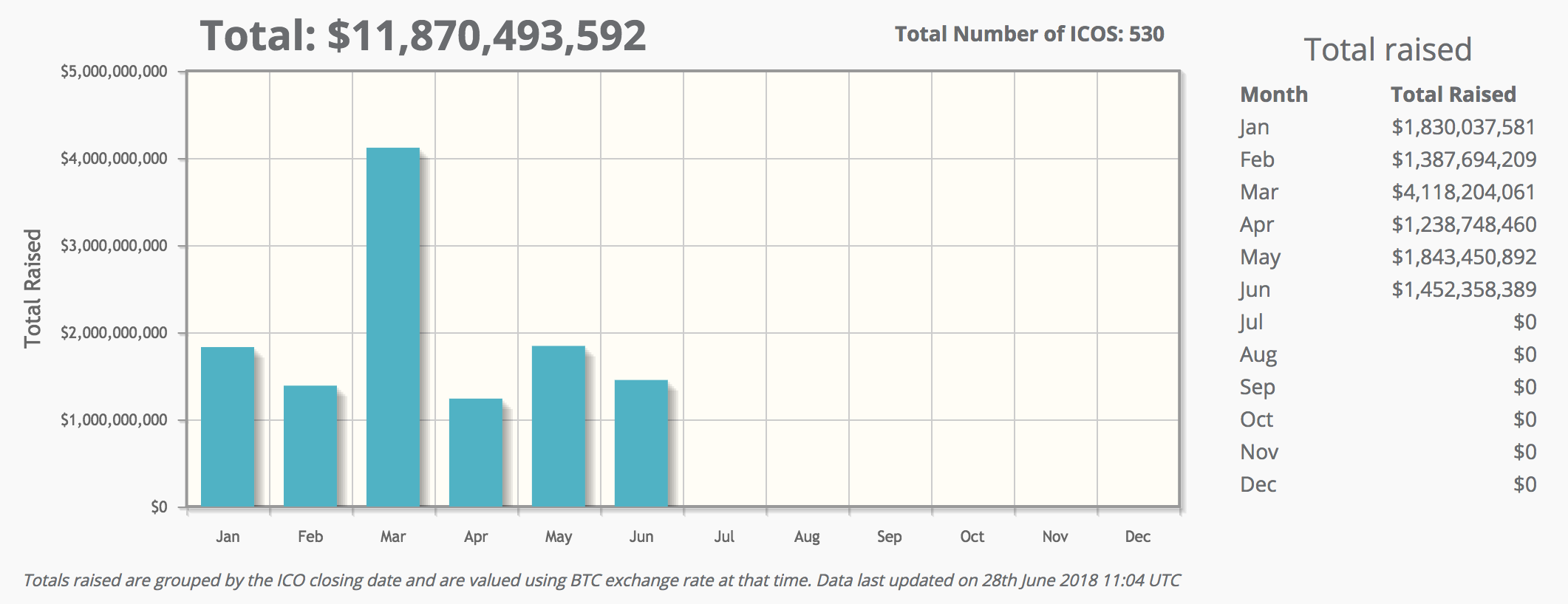
While Ethereum’s ecosystem of DApps is still in its infancy, it’s steadily growing as well. Last October, the curated DApp list State of the DApps listed only about 800 mainstream DApps; today, it lists just shy of 1,700 across 12 industries.
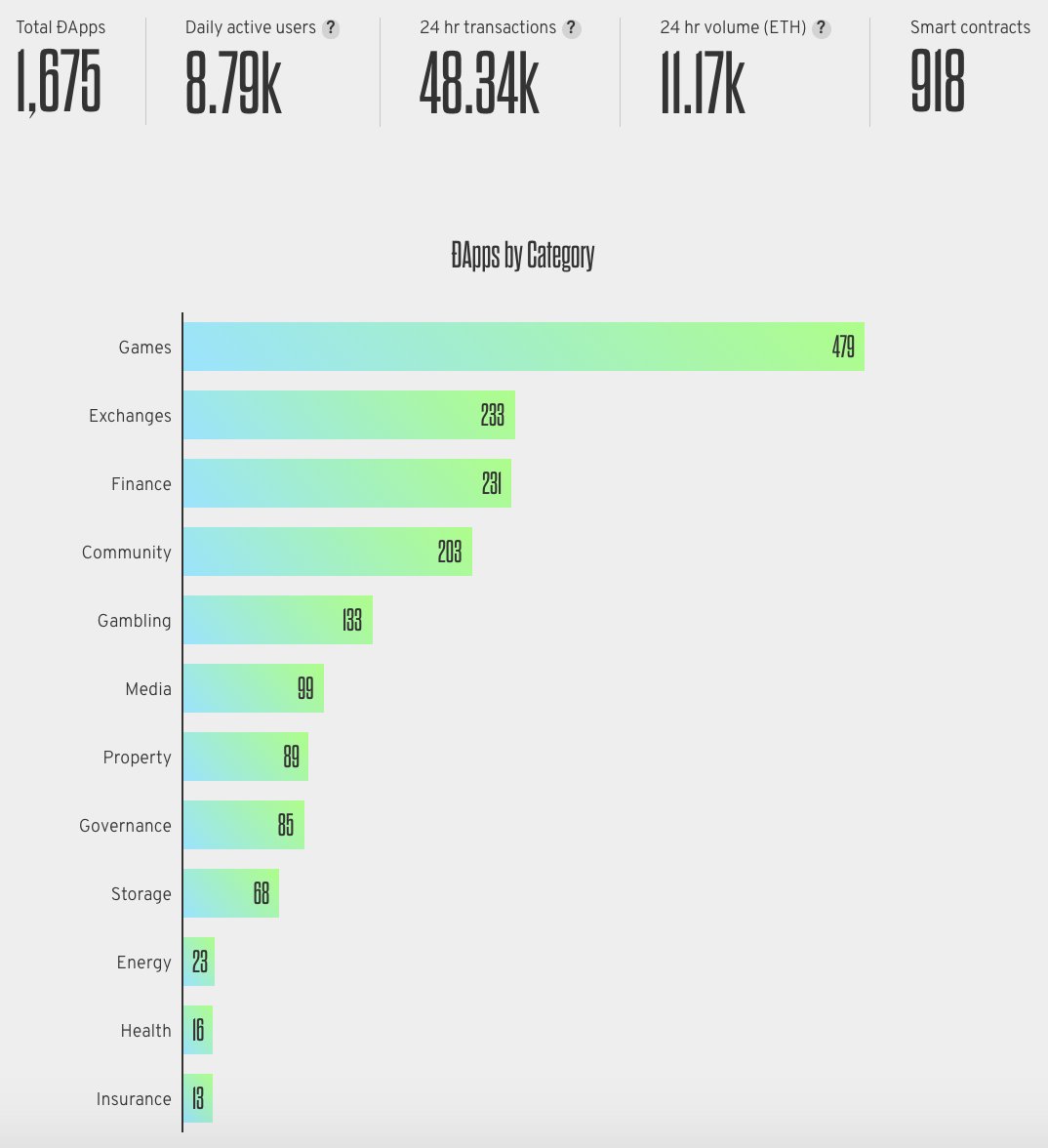
When it comes to Bitcoin Cash, the primary measure for ecosystem development is how many merchants accept it as payment. While it’s hard to get an exact number for this exact number of merchants, Bitcoin Cash took a momentous step forward in building its ecosystem when BitPay announced at the end of March that its tens of thousands of merchants would now be able to accept Bitcoin Cash. Roughly half of the ~1,400 companies tracked by the Accept Bitcoin Cash Initiative also now accept BCH.
It can be challenging to compare these different methods of growth — but in terms of market cap, BCH does seem to have earned a higher premium for its growth over the last year than ETH has.
Take a look at this table:
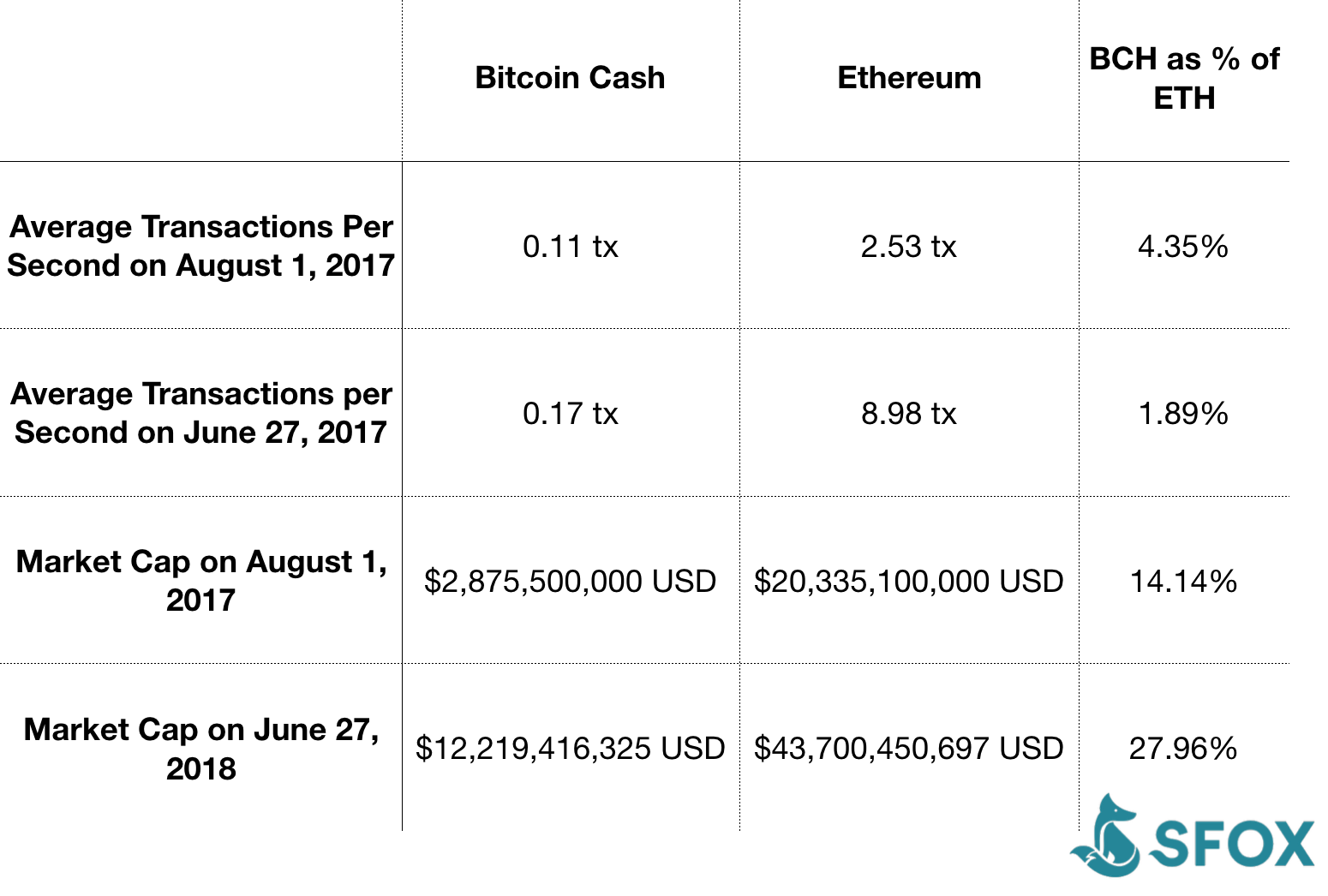
Even though the growth of Ethereum’s transaction volume has grown faster than Bitcoin Cash’s in the last year — increasing by ~350% compared with Bitcoin Cash’s ~150% increase — Bitcoin Cash’s market cap has grown from ~14% of Ethereum’s, to over a quarter of Ethereum’s. It’s difficult to attribute this increase to anything other than Bitcoin Cash’s increased acceptance as a currency, given the narrowness of its functionality.
Of course, we still have to keep things in perspective: Ethereum is older and more established than Bitcoin Cash, so it may just be the case that Ethereum is more mature as a cryptocurrency than Bitcoin Cash is. Whatever the case may be, it’s clear that both ecosystems are continuing to expand: BCH is penetrating the single market of payment systems more deeply, and ETH is achieving more breadth with respect to the many industries it touches through DApps and tokens.
New Decentralized Essentials on the Upswing
Few goods and services are as ubiquitous as money and software. If BCH and ETH end up eclipsing the current centralized versions of these utilities, they might end up radically changing the world we live in.
That future is still quite a ways off, but both of these cryptocurrencies are still rapidly growing. BCH seems to be growing faster right now, but who knows: A single DApp or scaling improvement could totally redefine Ethereum. If one thing’s for sure, it’s that a lot can change in crypto over a year.
The above references an opinion and is for informational purposes only. It is not intended as and does not constitute investment advice, and is not an offer to buy or sell or a solicitation of an offer to buy or sell any cryptocurrency, security, product, service or investment. Seek a duly licensed professional for investment advice. The information provided here or in any communication containing a link to this site is not intended for distribution to, or use by, any person or entity in any jurisdiction or country where such distribution or use would be contrary to law or regulation or which would subject SFOX, Inc. or its affiliates to any registration requirement within such jurisdiction or country. Neither the information, nor any opinion contained in this site constitutes a solicitation or offer by SFOX, Inc. or its affiliates to buy or sell any cryptocurrencies, securities, futures, options or other financial instruments or provide any investment advice or service.


